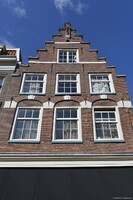Amsterdam Gabled Houses: Topographic Views
Gilchrist, Scott

Download1A2-N-A-DGH-A07_cp.jpg (471.8Kb)
Alternate file
Date
2013Description
Classic Dutch step gable (Trapgevel) with red brick and stone in 16th century style; The step gable first appeared in 1500 and was a feature of Dutch Renaissance architecture at the end of the 16th century. This was characterized by brick (mostly painted red) with layers of stone (mostly painted yellow) and by façades decorated with masks, cartouches and garlands. The later classicizing Baroque style brought such classical elements as the frame gable with tympanum. The mid-17th century saw French influence; luxuriantly decorated Rococo gables, sometimes in the form of a large crest, were used on narrow houses with neck gables and Dutch gables as well as on the larger patricians’ houses along the canals with frame gables. Most gables, especially lining the canals, have traditional hoist beams at the top, to raise goods and furniture up and into the narrow buildings. Source: Grove Art Online; http://www.oxfordartonline.com/ (accessed 7/14/2014)
Type of Work
topographical viewSubject
architecture, cityscape, contemporary (1960 to present), Restoration and conservation, historic architecture, Twenty-first century, Baroque, Seventeenth century
Rights
Rights Statement
Licensed for educational and research use by the MIT community only